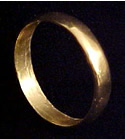While reading the right hand side of my book, I often tried to compare to the left and find anything I could recognize, but this depressed me after a few pages, and I just read the translation. I have been trying to follow what religion Beowulf and the Danes practice, but I am still confused. There are several references to Christianity, or Monotheism at the least, but there are also references to pagan worship. In lines 180-181 it is stated that "they did not know the Maker,/ the Judge of deeds, they did not know the Lord God," which implies the existence of only one god, the creator (Beowulf.) However, in lines 175-178 we learn that "At times they offered honor to idols/ at pagan temples, prayed aloud/ that the soul-slayer might offer assistance/ in the country's distress" which indicates praying to the devil (Beowulf.) It also describes Grendel as being a descendant of Cain, which is clearly a Christian reference, given that Cain was the first son of Adam and...

